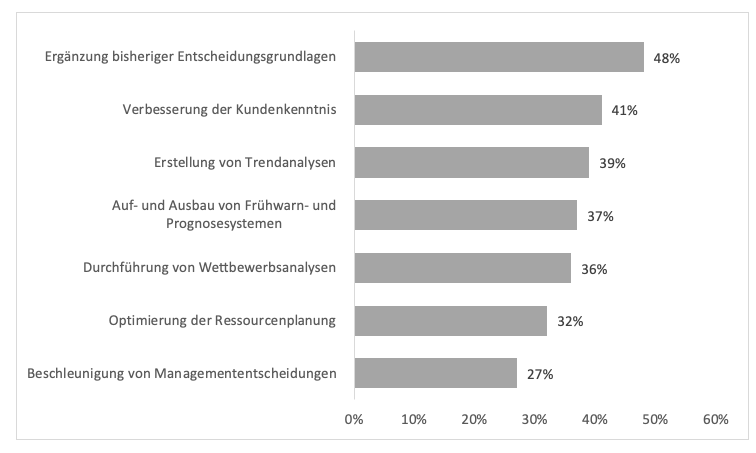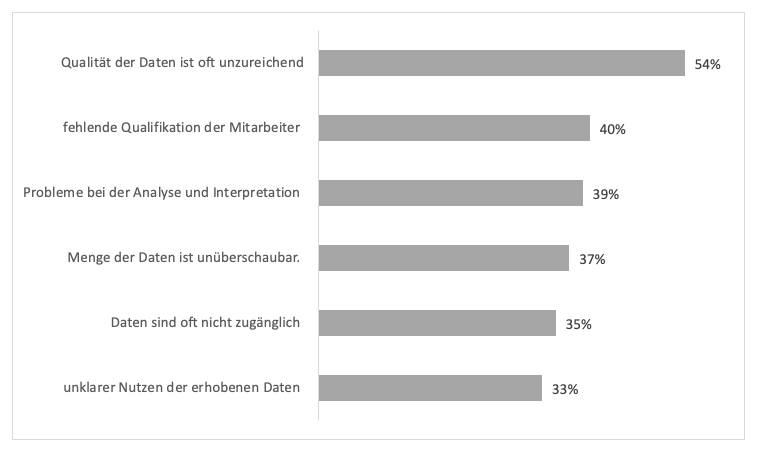The term big data describes the handling and evaluation of large amounts of data in the context of companies. Large amounts of data can be recorded via sensors, mobile phones, machines, customer cards, vehicles or come from social media and numerous other sources and, due to the large amount, must be stored, processed and evaluated using special procedures. I would like to present two relevant studies on this topic, which I analyzed in the course of my research work and thus convey the current status. Have fun while reading!
Study 1: Bitkom 2014
The first study was carried out by Bitkom in 2014. On the basis of over 500 participants, senior managers from German companies were surveyed online. The study is no longer completely up-to-date, but the information can help to compare the results from 2014 with the second selected study from 2018. First, the study will be presented to Bitkom (2014).
The aspect of the use of Big should be emphasized Data in companies. According to the study, 9 out of 10 participants initiate the Time of the survey Projects in the company that deal with the topic of Big Data are to be assigned. The companies try to evaluate the following data:
- Master data (3%),
- Transaction data (3%),
- Log data (31%),
- Sensor data (25%) and
- Web content (9%).
The main areas of application for data evaluation are the areas
- Marketing & Sales (74%),
- Finance (44%),
- IT (33%),
- Logistics (33%) and
- Staff (26%).
The main potential that companies expect in this area are listed in the following figure. In this context, what should be mentioned above all is the addition of previous decisions, the improvement of customer knowledge and the creation of trend analyzes.

Current obstacles in the use of big data were also recorded in the study. The most frequently mentioned were:
- Criticism from customers (31%),
- high costs (23%),
- Damage to public image (23%) and
- Ethical and moral reasons (14%).
Commerzbank 2018
Another, more recent study on this topic was carried out by Commerzbank in 2018. The study results are based on a survey of over 2000 managers from companies who say they are responsible for big data projects.
According to the study, over 80% of the Study participants carry out big data projects in the company. Most projects are in the retail (49%), wholesale (46%) and manufacturing industry (46%) as well as in companies with over 100 million euros Sales (52%) realized. These details are in a clear In contrast to those from the Bitkom study from 2014.
Also exist regarding the source of the data Differences to the study from 2014, as mainly internal data and few external sources are mentioned:
- Financial data (67%),
- Employee utilization (55%),
- Inventories (54%) and
- Customer satisfaction (50%).
In an overall view, many results show both Studies have similarities and rather differ in the strong focus of the Study by Commerzbank (2018) of retail companies (e.g. utilization of Employees and stocks).
Two further aspects regarding the chances resp. the barriers to using big data in the company. According to the study are the main opportunities:
- Decision-making confidence (58%),
- Utilization of resources (57%),
- Automation of processes (54%) and
- Financial analysis (46%).
With regard to the obstacles in the use of big data, the following were primarily mentioned: quality of the data, qualification of employees and problems with the evaluation (see figure).

Conclusion
Overall, the comparison of the odds between the two studies reveals many similarities. Clear differences can be found in relation to the obstacles, which in the first case are seen more in costs and damage to the image and in the second as internal obstacles in the form of employees and the data basis.
swell
Commerzbank. (2018). The raw material of the 21st century: Big Data, Smart Data – Lost Data? Retrieved May 20, 2020, from https://www.iais.fraunhofer.de/de/geschaeftsfelder/big-data-analytics/referenzprojekte/big-data-studie.html
Bitkom. (2014). Potential and use of big data – results of a representative survey of companies in Germany. Retrieved May 20, 2020, from https://www.bitkom.org/sites/default/files/file/import/Studienbericht-Big-Data-in-deutschen-Unternehmen.pdf
[werbung] [fotolia]


